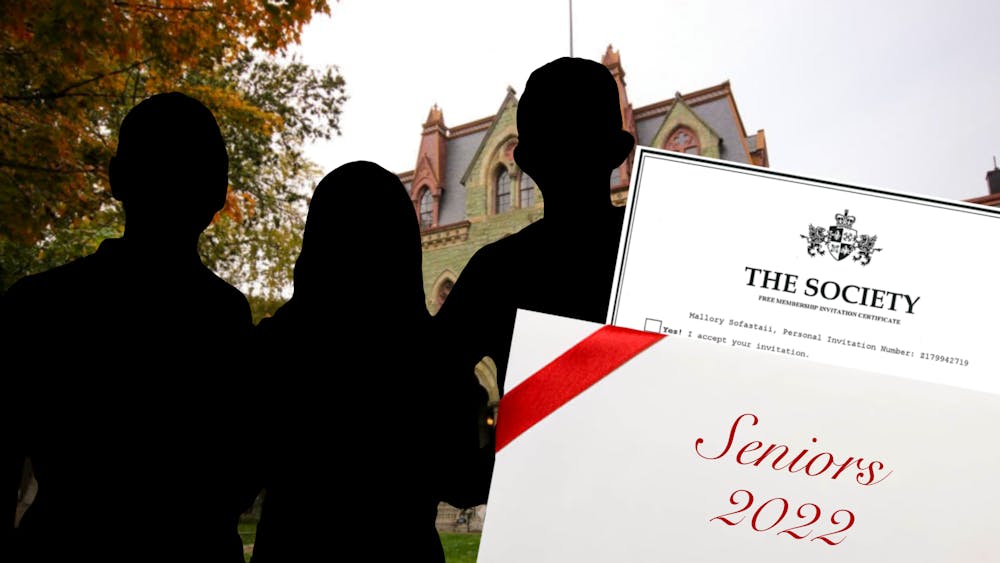Senior societies are meant to assemble fourth-year students who share a common interest, identity or commitment to leadership for informal social events and networking. Every spring and/or fall, these societies recruit and initiate new members. As an outside observer who is not a member of a senior society, I believe that these clubs can improve in inclusivity and transparency, specifically in relation to recruitment and membership fees, otherwise known as dues.
I remember my personal experience rushing for four application-based senior societies. It was odd going through recruitment last year on Zoom when classes were still virtual. I felt like a politician, introducing myself to people in break-out rooms and fishing for members’ votes by organizing virtual coffee chats with those who did not know me.
As I swung into my final year at Penn, I hoped that senior societies may give me the close friends I longed for. For better or for worse, I was cut from all four societies that I applied for.
Rather than swim in my self-pity, I decided to reach out to people in senior societies to learn more about them. The oldest senior societies, Friars and Sphinx, both declined to comment. In these traditional societies, they “tap” their prospective members, meaning people are chosen by the current members with no open application.
I asked sources about what they would change about senior societies. Rowana Miller, a fourth-year in the College and a member of the arts-based Osiris Senior Society, suggested that “having a culture of exclusiveness is just not as conducive to them [senior societies] achieving their goals of connecting people with similar interests as admitting everybody.”
If she were able to change these societies, Miller advocated that she would want “everyone who applies to get in.”
Temidayo Ojo, a College senior who is a member of Osiris and Co-President of Onyx Senior Society, which supports underrepresented students at Penn. Ojo described that the perceived exclusivity of senior societies is due to a lack of transparency of the club’s mission and how they choose their incoming class of members.
Ojo elaborated that senior societies do not receive funding from the Student Activities Council (SAC). She justified this as the reason why Onyx “can’t have a huge number of seniors in the society” because if they did have more members, “we [would have to] collect a huge amount of dues, but we don’t want to do that.”
SEE MORE FROM JADEN CLOOBECK:
Ojo noted that Onyx refrains from advertising the cost of dues, though they will disclose the amount to applicants and members if they ask. Ojo also mentioned that Onyx offers subsidies for first-generation, low-income students.
I also spoke with Sav Grinspun and Olivia Schwartz, both College seniors and Co-Presidents of Kinoki Senior Society, meant for students interested in film. Greenspun described that “there is no part of the process to not be transparent about.” Schwartz added that “we’re transparent with people that are interested in the club…[and] with all the members in the society…Nothing’s secret. It’s all on a drive.”
Schwartz emphasized that the cost of dues is not a barrier to entry and wrote to me in an email that “if a member were to have trouble meeting the amount we would work with them individually and discreetly to figure something out.” Schwartz also highlighted that Kinoki wants to build a “network for the [entertainment] industry that is equitable.”
In my opinion, I think there should be transparency about dues at the outset. Imagine if you would only find out how much Penn’s cost of attendance was after you were accepted. This would unleash widespread indignation. Even with financial subsidies being available for applicants, I think dues should be disclosed before people are admitted.
As for advice for people interested in senior societies, I agree with Rowana Miller to “think of [joining a senior society] as something fun” and not as “added stress.” Temidayo Ojo added to “put yourself out there because it’s really worth being able to interact with new people.” Sav Grinspun said that it is helpful to make friends “especially [with] people who are older than you.”
I also think that senior societies have to become more transparent about their initiation rituals before they accept new members, especially if there is hazing involved (which should be reported).
While senior societies may fit for some people, they are not necessary to meet new people during your final year.
There are other ways to meet new people. You can find new friends in classes, clubs or elsewhere.
For instance, Senior Club (formerly called Feb Club) is a month-long event extravaganza where all soon-to-be-graduates are able to kindle friendships during their final semester.
Whether or not you rush a senior society, I hope senior societies can become more inclusive and transparent over time.
JADEN CLOOBECK is a College fourth-year from Laguna Beach, Calif. studying psychology. His email address is jaden@sas.upenn.edu.









